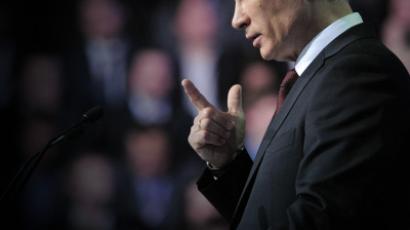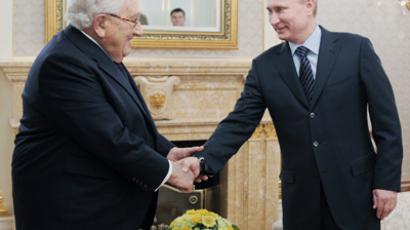Putin laces up Russia's bootstraps
Russia must develop the defensive capacity to respond to immediate and future threats to its security, writes Prime Minister Vladimir Putin in his latest article.
The leading contender in the upcoming presidential race has outlined his ideas on developing Russia's defenses in an article published Monday in Rossiiskaya Gazeta. Speaking about the "unpredictable risks" of our modern times, Putin warned that foreign actors on the geopolitical stage may be "tempted to solve their problems at someone else’s cost by means of force."The prime minister warned that Russia should never be in a situation where it may "tempt anyone by our weakness.”That is the reason, Putin writes, that under no circumstances will Russia allow its strategic deterrence potential to fall behind. It was that very potential, he reminded, that helped the country secure its sovereignty in the turbulent 1990s – when, “frankly speaking, we had no other weighty arguments.”
Read Prime Minister Vladimir Putin's full articleRead related column here
Outlining global prospects
Looking down the road to potential threats, Putin noted that the likelihood of a nuclear war is extremely low, as such a scenario would would mean the end of civilization.“As long as the ‘gunpowder’ of the strategic nuclear forces, built by the titanic work of our fathers and grandfathers, remains ‘dry’, no one will dare launch a large-scale aggression against us,” the prime minister assures his readers. At the same time, however, the Russian military should continue to develop other fields of research."We should take into account that technological progress in various areas – from new models of weapons and military hardware to information and communications technology – has fundamentally changed the nature of armed conflict." The leading candidate in next month's presidential elections predicted that "high-precision long-range weapons with conventional charges…will become the means of achieving a decisive victory in conflicts, including a global conflict."Putin also reminded readers about the threat of regional and local wars that are breaking out dangerously close to Russia's borders. Some of these conflicts, he says, are being "purposefully" provoked."Today, we see how new regional and local wars break out one after another. We see zones of instability and artificially maintained, managed chaos emerging. Furthermore, we see how some are purposefully provoking such conflicts in the immediate vicinity of Russia’s borders – and those of our allies."In the midst of this growing chaos, Putin lamented the fact that the fundamental principles of international law are being "devalued and eroded, especially in the matter of international security."In such unpredictable conditions, the prime minister states, Russia may not always be able to rely on diplomatic and economic methods for resolving conflicts. Thus, Russia must enhance its deterrent military potential and strengthen its capacity to defend itself.“And the military, special services and other power structures should be prepared to quickly and effectively react to new challenges," he said. Putin also stressed that Russia, together with its allies, "should strengthen the capabilities of the Collective Security Treaty Organization, including the Collective Rapid Response Forces. The CSTO is ready to fulfill its mission of the guarantor of stability in Eurasia."
Ten-year outlook
Putin wrote that the military has begun a large-scale rearmament of the army, navy and other defense structures. “The priorities are nuclear forces, air-space defense, systems of communication, surveillance and management, radio-electronic means, unmanned aircraft and robotized strike systems, modern transport aviation, soldiers’ personal protection systems, precision weapons and the means of combating them.”Speaking on the "growing role of the Navy, Air Force and Aerospace Missile Defense" in the coming decade, Putin left no room for doubt as to the primary reason for fortifying Russia's air defenses."We are forced to take decisive steps to bolster our national aerospace defense system to counter the U.S. and NATO efforts in the deployment of missile defense," he explained.In response to the US-NATO missile defense shield being built in Eastern Europe without Russia's participation, Russia must respond with either a "domestic missile defense system" that will prove "costly" and "ineffective," or a "retaliatory potential" that is capable of overwhelming "any missile defense." Putin says the task for ensuring Russia's territorial integrity will fall to "the Strategic Nuclear Forces and aerospace defense units."Saying one cannot be ‘too patriotic’ about this issue, the prime minister vowed that "Russia’s military response to the global US missile shield, including its European part, will be effective and asymmetrical, a match for US missile defense policy.To summarize his ambitious plans, Putin says"the goal for the decade is to equip our Armed Forces with next-generation armaments, which boast better visibility, higher precision, and faster response than the similar systems of any potential adversary."
Attracting top recruits
For years, it has not been uncommon for Russian males to shun the military draft due to poor wages, deplorable and sometimes dangerous conditions in the barracks. Vladimir Putin promises to change all that and give Russia a “fully professional army.”“We are aware that the current conscription service is fraught with social inequality,” Putin wrote. “Among those drafted are mainly teenagers from poor working or farming communities, those who did not make it into a university or college and could not use the right to a deferment.”Russia needs to boost the prestige of active duty service so that young people will start viewing it as a privilege, not an obligation, he added.One way to make a military career more attractive is to offer competitive wages.“The Armed Forces, as an employer, are becoming ever more competitive, changing the status quo and making army service more appealing,” the Prime Minister acknowledged. “Since January 1, 2012, officers within the Interior Ministry are also entitled to a pay rise. Other branches of the military, law enforcement and special services will see a pay rise from January 1, 2013.”“Their pay must be on par with, or even higher than that of the qualified specialists and managers in the leading industries of our economy,” he added.Putin also mentioned other perks that will come with military service, including better pension plans, healthcare and special educational opportunities.This overhaul of the Russian military will help to make a military career attractive, thereby tapping the best qualified from the national labor pool.“Selection will be multi-stage and extremely tough,” Putin asserted. “Non-commissioned officers are the backbone of the Army, supervising discipline and combat training; this position must be awarded to worthy servicemen who have the appropriate moral, physical and educational levels.”Following this recipe for change, Putin estimates that by 2017, “out of one million servicemen in the Russian Army, 700,000 should be professionals – officers, graduates of military academies, sergeants and contract soldiers.”The Army must reclaim its traditional role as a major springboard for a career, he said.Finally, Putin advised that special attention be given to the “initial military training and the patriotic upbringing of Russian schoolchildren.”“Conscription service lasts just 12 months, and soldiers must focus entirely on combat training,” he reminded. “It means that those who are drafted need to be physically fit, healthy, possessing basic computer skills and an ability to operate a vehicle.”Putin closed his article by reminding his readers that “Our goals in defense and national security cannot be achieved without high morale and motivation…or without respect for the Armed Forces and for military service in Russian society.”Robert Bridge, RT














